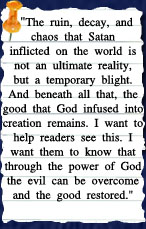


|
Focus on Fiction is pleased to feature Thomas Williams Tom is an acclaimed author, as well as the designer and illustrator of over 1500 Christian book covers. He served as executive art director for Word Publishing for many years, and is a five-time winner of the Christian Booksellers Associationís best book jacket award. Now a full-time writer and creative design consultant, Tom makes his home with his wife, Faye, near Fort Worth, Texas.
|
|
Focus: Tom, thank you so much for joining us! Can you begin our interview by telling us how many books youíve had published in the Christian market? Thomas Williams: I have a total of eight books: three fiction, three non-fiction, and two books of one-act plays. I also have three upcoming books presently under contact. Focus: Letís talk about your three fantastic fiction books- The Crown of Eden, The Devilís Mouth, and your newly released story, The Bride of Stone. Could you give us a quick synopsis of each? Thomas Williams: The Crown of Eden tells the story of Princess Volanna, who in obedience to a prophecy, has vowed to wed a prince she has never met. When the prince shows himself to be evil, she inadvertently falls in love with Aradon, a courageous blacksmithís son who is unaware of her royalty. Yet her integrity holds her to the vow until an astounding revelation turns their world on its head. The Devilís Mouth tells of Prince Lanson, forced by usurpers into fleeing for his life. During his flight, he finds an abandoned baby in the woods and frees the beautiful Evalonne from forced harlotry to care for the child. In spite of all odds, the two fall in love, and when Lanson regains his throne he must choose between Evalonne and the woman his father has chosen for him. His choice puts his life on the line. The Bride of Stone tells three intertwined stories: the rise and fall of Perivale, founder of the Seven Kingdoms; his daughter Avalessaís plunge into despair; and the entrapment of the sculptor Davian by the enthralling beauty of an unearthly woman. Davian and Avalessa are drawn together, and they begin to help each other overcome the past. But a terrible secret stands in the way. Focus: The Bride of Stone is actually a prequel to The Crown of Eden and The Devilís Mouth, yet its release comes several years after these two were published. Did you write The Bride of Stone in response to reader requests for the story of King Perivale? Thomas Williams: Not really. I received many reader requests for more Seven Kingdoms novels, but not specifically for a prequel. The idea for the prequel developed as I was writing The Crown of Eden. Focus: In part, The Bride of Stone is a re-telling of the ancient tale of Pygmalion. Would you share a little about that myth with our readers, and tell us why it inspired your story? Thomas Williams: In ancient mythology, Pygmalion was a young sculptor who hated women because of a bad experience. Then he created the perfect statue of the ideal female and fell in love with his own work. Venus granted life to the statue, and the sculptor and his creation presumably lived happily ever after. Seeing the movie The Stepford Wives caused me to wonder if a man would really be happy living with a perfect, artificial woman. I adapted the Pygmalion myth to explore that question. The story of Davian in The Bride of Stone begins exactly parallel to the myth, but it certainly doesnít end that way. Focus: Your books are all based in this incredible world of dark forests, shining castles, soaring statues, and shimmering waterfalls. Add to that the bold rescues by knights in golden armor, quiet acts of valor by beautiful maidens, and evil schemes of the black-hearted Morgultha, and youíve given us stories weíll never forget! Did you see this world in your head when you first started writing? Or has it grown with each book? Thomas Williams: Some of both, I suppose. I had the basic world in my head before I began The Crown of Eden. But of course, it grew with the writing. I know I am influenced by a lifelong love of the Arthurian legend, as well as the works of William Morris, C.S. Lewis, and J.R.R. Tolkien. I hope readers rediscover in my fiction the glory that God infused into all creation, including men and women. Focus: The character I loved most in all three of your novels is the one with the most names. How did you choose the names for Father Lucidis (aka. Father Agapes, Father Verit, Father Clemente, etc.)? Does each name have a significance or meaning specific to the situation? Thomas Williams: I had fun with those names. Yes, each is a coined name based on a real word. Each has significance relating specifically to the need of the person to whom he appears. I probably shouldnít spoil readersí fun by giving away the meanings, but I will explain one. Verit is meant to suggest truth (veritable, verify, verity, the biblical verily). Perhaps readers can take it from there. Focus: One of my absolute favorite scenes is found in The Devilís Mouth, when King Lanson, who is trapped in the labyrinth caves of the Nephilim, discovers Father Clemente has been helping him all along. How does this scene convey your conviction about Godís presence in our lives? Thomas Williams: I believe Godís providence surrounds us all the time. As C.S. Lewis has his Puddleglum say in The Silver Chair, ďThere are no accidents.Ē Of course, I donít know just how God makes all incidents work together for our good, but my own experience convinces me that He is always there. Focus: You mention the Nephilim several times in your stories, and talk about the unholy wisdom they brought to earth. What do you think about the half-man, half-beast creatures of ancient mythology? Do you think they have any connection to the Nephilim of the Bible? Thomas Williams: Thatís a fascinating question, and of course, I canít give you a real answer. If C.S. Lewis is right, much of what we find in ancient myth could be images of realities not on this earth or that no longer exist. Whether they might be images of the Nephilim, I have no idea. Many of my ideas about the Nephilim came from the ancient Book of Enoch. But most are from my own imagination. Focus: Besides fascinating characters and story plots filled with action, romance, and even a few monsters, your books also include beautiful lines of prose in the form of poems, and songs. Did you write all these poems and lyrics yourself? Thomas Williams: Yes, I confess. But in defense of the verses, none are meant to be very lofty, but rather something more like folk poetry, such as traveling minstrels might sing in medieval times. Writing the poems was great fun. Focus: You worked as an art director for many years, both in your own company, and for W Publishing group. Did you design the covers for your books? Thomas Williams: I did the illustration for The Crown of Eden as a traditional oil painting. The one for The Devilís Mouth was my first venture into digital art. Since then, I have been too busy writing to do my covers. Kirk DouPonce designed The Bride of Stone, leasing a painting by the nineteenth century British romantic Frank Dicksee, which happened to fit a scene in the book perfectly. I have been very pleased with Kirkís work and feel content to let him keep it up. They say that the lawyer who defends himself has a fool for a client. Perhaps the same principle applies to authors who do their own covers. Focus: Two themes I see glimmering within the threads of all your tales are the glory of obedience rather than sacrifice, and the danger of choosing the counterfeit over the real. What specific advice would you give to our readers about these two themes? Thomas Williams: You donít come to God because Christianity promises the rainbow; you come because he is the truth to whom we must conform even at the cost of pain and loss. All other happiness is counterfeit. When we seek God only, we get God and joy as well. Volanna and Aradon, Evalonne and Lanson, Avalessa and Davian all made sacrificial choices. They put their lives on the line or renounced their hope of happiness with no promise that their sacrifice would be rewarded. Itís the universal choice that in some way, every Christian must make. I hope the Seven Kingdoms novels help readers cut through the ambiguity that now surrounds good and evil to where they can make this choice clearly. Focus: What other impact do you hope your stories will have on readers? Thomas Williams: The scores of letters and emails I receive from readers tell me that they often get things from my books that surprise me. The most striking example is in several letters from mothers saying they gave The Crown of Eden to their teenage sons to teach them how to treat a woman. It never occurred to me that that book could be a handbook on masculine chivalry. And rather than bothering me, I find that gratifying. One man who recently lost a son happened to read The Devilís Mouth while he was grieving. He told me that Father Clementeís explanation of Evalonneís loss of her baby helped him immensely. Others have told me of all sorts of hidden meanings they have found in the books. All this confirms the novels to be mythic rather than allegorical. They express universal realities that have multiple applications and meanings. And I am pleased that readers sometimes find in them just what they happen to need in spite of what I may have intended. I hope, however, that all readers will glimpse in these stories a sense of innate beauty that permeates all creation, including every human. The ruin, decay, and chaos that Satan inflicted on the world is not an ultimate reality, but a temporary blight. And beneath all that the good that God infused into creation remains. I want to help readers see this. I want them to know that through the power of God, the evil can be overcome and the good restored. Focus: Now that The Bride of Stone has been published, what are your future writing plans? Are there more tales from the Seven Kingdoms ahead? Or do you have other stories brewing? Thomas Williams: I expect to keep writing as long as God grants me the ability and publishers keep issuing contracts. Two of my upcoming non-fiction books are in first draft (including another with Josh McDowell), and when they go to press I expect to turn back to fiction. I have two more Seven Kingdoms plots roughly sketched, as well as one for a contemporary novel. Who knows which of those will see daylight? Whether I do another Seven Kingdoms book always depends on the success of the previous one. So if enough of your subscribers buy The Bride of Stone, there will likely be another sequel:) Focus: Is there anything else you would like your readers to know? Thomas Williams: My books have a broad range of reader types, including people who love romance, medieval fiction, story-driven plots, and multi-level meanings. Some enjoy exploring the deeper meanings, while others hardly know those levels exist. They focus solely on the romance or the plot development. To anyone out there who might shy away from my fiction because of the mythic or theological/philosophical elements weíve hinted at, let me assure them that in my books, the story is always first. The first duty of a fiction writer is to tell a good story. To put first such things as deeper meanings or didactic lessons is an affront to fiction buyers. The novel is much richer if it has deeper meanings, but not if they drag down the story. My books can be read for the story only. But they also offer more for readers who want to find it. |











© Focus on Fiction, 2003-2005 All Rights Reserved. Site maintained by PulsePoint Design. Direct questions or comments here
| Home | Upcoming Author Interviews | Past Author Interviews | Christian Fiction Reviews | About Us | | FAQís | Contact Us | Links |